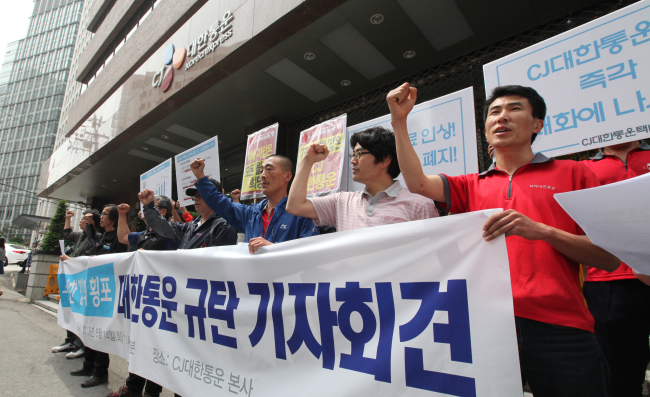Couriers employed by CJ Korea Express are unlikely to end their strike anytime soon, drawing attention to their worsening labor conditions amid cutthroat competition in the fast growing market.
Around 1,000 delivery drivers have joined the strike so far, demanding the nation’s largest parcel delivery company sit down for talks to raise their wages.
The couriers claim that CJ lowered the delivery commission by about 100 won to around 800 won per parcel after merging with Korea Express, causing them to earn less wages while imposing excessive penalties for damaged parcels and other accidents.
The strike that began on May 4 with fewer than 300 messengers participating is dragging out and growing in size amid intense competition in the parcel delivery business that keeps pushing down delivery costs.
A consumer pays an average of 4,000 won to send a package that weighs less than 1 kilogram. Thirty percent (1,200 won) is commission for the courier who picks it up, 25 percent (1,000 won) for delivery to the destination, 300 won for sorting the parcels at the logistics terminal and 250 won for transportation, leaving around 230 won as operating profit per parcel for the company.
Around 1,000 delivery drivers have joined the strike so far, demanding the nation’s largest parcel delivery company sit down for talks to raise their wages.
The couriers claim that CJ lowered the delivery commission by about 100 won to around 800 won per parcel after merging with Korea Express, causing them to earn less wages while imposing excessive penalties for damaged parcels and other accidents.
The strike that began on May 4 with fewer than 300 messengers participating is dragging out and growing in size amid intense competition in the parcel delivery business that keeps pushing down delivery costs.
A consumer pays an average of 4,000 won to send a package that weighs less than 1 kilogram. Thirty percent (1,200 won) is commission for the courier who picks it up, 25 percent (1,000 won) for delivery to the destination, 300 won for sorting the parcels at the logistics terminal and 250 won for transportation, leaving around 230 won as operating profit per parcel for the company.

The profit structure is worse for corporate parcels that account for 95 percent of the volume handled by delivery firms.
The average delivery cost for a corporate parcel is 2,200 won, 330 won of which goes to the courier who picks it up, 880 won to the delivery guy and 920 won for transportation expenses, leaving 70 won as the company’s profit.
Even if the delivery person receives 880 won, after deducting costs for fuel, insurance, telephone and monthly installments on the vehicle he uses, he makes around 676 won per parcel.
The irony is that the parcel delivery market is growing by some 300 billion won each year.
Thanks to the rapid growth of home shopping and Internet shopping, the size of the parcel delivery market grew from 2.72 trillion won in 2009 to 3.52 trillion won last year.
But because companies pick their courier service firms through price bidding, competition to offer the service at lower costs is inevitable.
The average delivery cost was 3,500 won in 2000, but it dropped by nearly 1,000 won in 10 years to 2,505 won in 2010. The delivery cost for corporate clients, who account for most of the delivery volume, is around 2,200 won per parcel.
Even China charges an average delivery cost of 3,300 won per parcel, according to industry officials. The average delivery costs are around 10,000 won in the U.S. and 7,000 won in Japan.
Industry officials say that legislation on parcel delivery is necessary to provide legal grounds to raise delivery costs based on a standard rate system.
CJ Korea Express, in the meanwhile, said the earnings of delivery drivers would surge by over 40 percent by the end of this year as the average distance they have to travel has been reduced due to systematic improvements.
CJ is urging the messengers to return to work, claiming that it promised to reimburse them should they receive lower incomes compared to before the merger with Korea Express.
By Kim So-hyun (sophie@heraldcorp.com)
-
Articles by Korea Herald



















![[Today’s K-pop] Treasure to publish magazine for debut anniversary](http://res.heraldm.com/phpwas/restmb_idxmake.php?idx=642&simg=/content/image/2024/07/26/20240726050551_0.jpg&u=)